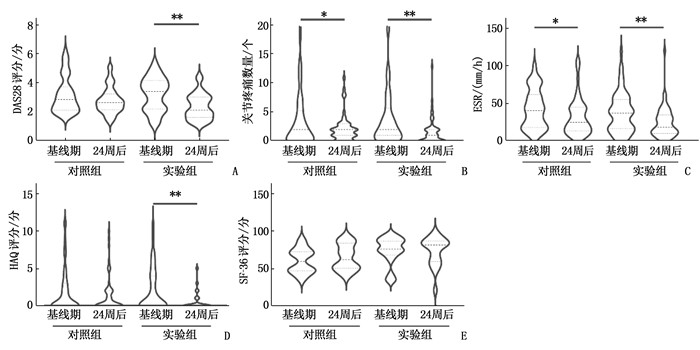Application of App-based disease self-assessment in patients with rheumatoid arthritis
-
摘要:目的 探讨基于App的疾病自我评估对类风湿关节炎患者疾病活动度的影响。方法 将风湿免疫科门诊就诊的类风湿关节炎患者119例纳入本研究,采用中心化随机分组并剔除失访者后最终纳入110例患者,其中实验组56例,对照组54例。实验组使用智能疾病管理系统(SSDM)进行疾病评估管理,对照组进行常规医疗随访。分别于基线期及24周后对患者进行病情评估,比较2组患者病情活动度。结果 经24周治疗后, 2组疾病活动度评分(DAS28)、关节疼痛数量、健康评估问卷(HAQ)评分、血沉改善程度比较,差异有统计学意义(P <0.05), 但2组简明生活质量量表(SF-36)评分比较,差异无统计学意义(P >0.05)。结论 基于App的疾病自我评估有利于类风湿关节炎患者的病情控制,有利于患者关节功能改善和生活质量的提高,对患者疾病结局有积极意义。Abstract:Objective To explore the effect of App-based disease self-assessment on disease activity of patients with rheumatoid arthritis.Methods A total of 119 patients with rheumatoid arthritis in rheumatology outpatient department were enrolled in this study. A total of 110 patients were included after centralized randomization and exclusion of lost visitors, including 56 patients in the experimental group and 54 patients in the control group. Patients in the experimental group received self-assessment and management with Smart System of Disease Management (SSDM) for disease assessment management, while patients in the control group received routine follow-up. The disease conditions of all the patients were assessed at baseline time and 24 weeks after treatment.Results At 24 weeks after treatment, 28-joint Disease Activity Score (DAS28), the number of joint pain, the Health Assessment Questionnaire (HAQ) score, and the improvement of erythrocyte sedimentation rate in two groups showed significant differences (P <0.05). However, there was no significant difference in 36-Item Short-Form Health Survey (SF-36) score between the two groups (P >0.05).Conclusion App-based disease self-assessment is beneficial to the disease control, improvement of body function and quality of life in patients with rheumatoid arthritis. It has positive significance to the disease outcome of patients.
-
Keywords:
- App /
- disease self-assessment /
- rheumatoid arthritis /
- disease activity
-
类风湿关节炎(RA)是一种以侵蚀性、对称性多关节炎为主要临床表现的全身性自身免疫性疾病[1-2]。RA发病年龄为40~60岁,患者早期表现为关节疼痛肿胀,随着疾病的进展,关节会出现不可逆的损伤,最终导致关节畸形、功能丧失。尽早进行疾病治疗、控制疾病进展、预防和减少骨关节的损坏对改善患者预后意义重大[3-4]。美国一项调查[5]显示, RA的医疗成本大约是每人每年20 919美元,是非RA患者的3倍。目前,中国RA患者的慢性病管理主要包括电话随访、门诊随访、建立疾病档案等,但由于风湿免疫病学专业的特殊性,基层医疗力量较为薄弱,造成部分患者随访及用药不规范[6]。近年来,随着通信技术的发展和电子设备的普及,基于互联网的疾病管理软件被广泛应用于慢性病患者的健康管理[7-9]。本研究从病情评估、心理及生活质量等方面探讨基于App的疾病自我评估对RA患者疾病活动度的影响,现报告如下。
1. 资料与方法
1.1 一般资料
选取2019年7—12月在南京医科大学第一附属医院、苏北人民医院风湿免疫科门诊就诊的RA患者119例为研究对象。纳入标准: ①符合1987年美国风湿病学会(ACR)关于RA的分类标准及2010年ACR/欧洲风湿病防治联合会(EULAR)关于RA的分类标准和评分系统; ②年龄18~65周岁者; ③意识清楚,自愿参加本研究,有一部智能手机且能熟练使用者; ④签署知情同意书者。排除标准: ①不能进行自我评估者; ②存在各种精神神经障碍者。本研究为双中心、开放性、前瞻性病例对照研究,采用中心化随机分组方法。选取病情评估疾病活动性评分(DAS28)作为主要研究终点,采用PASS软件进行样本量估计,估算实验组和对照组样本量为36例,考虑20%的失访可能,最终计算所得2组样本量各为45例。最终实验组RA患者60例,其中失访4例,最终纳入56例; 对照组RA患者59例,其中失访5例,最终纳入54例。本研究经南京医科大学第一附属医院伦理委员会审查批准(伦理号2018-SR-311)。
1.2 方法
对照组患者正常进行门诊随访治疗,在基线期及第4、8、12、16、20和24周分别进行针对患者诊疗方案的健康宣教,包括药物、饮食、活动、康复自我检测等,并发放健康教育手册,进行药物治疗登记。实验组患者通过智能疾病管理系统(SSDM)使用基于App的疾病自我评估进行线上随访登记。在基线期指导患者下载手机端App(风湿中心),并规范相关数据的填写和录入,之后第4、8、12、16、20和24周均需进行1次App的综合评估,之后生成疾病动态评估,用药及检验动态趋势图,医护人员根据App评估结果制订药物、饮食、活动、康复自我监测等针对性健康宣教方案。此外, App设有线上健康教育模板,定期更新RA相关知识; 线上设立问诊模块,便于了解患者在治疗中的疑惑,由研究小组成员根据患者提出的疑问给予患者针对性指导。在基线期和第24周,分别由研究小组医生团队对患者病情进行线下面对面综合评估。
SSDM是一款成熟的自身免疫性疾病的自我管理软件,分为患者使用的“风湿中心”患者移动端App和医生使用的“风湿专家”医生移动端App, 以及与之匹配的云数据中心。SSDM的患者端App可录入患者基本信息(姓名、性别、年龄、所患疾病、确诊时间)、诊断结果、用药方案、实验室检查结果以及系列疾病活动度评估(具体评估表格根据所患疾病有所不同)、生活质量评估量表(SF-36), 同时可把影像学检查的报告拍照上传,建立患者专属的个人电子病历,并可实时对异常结果报警,对数据实施动态分析。病情实时评估体系采用可视化技术,患者可以在动画画面上完成28个关节的触痛及肿胀评估,系统自动生成国际学术界公认的DAS28, 并可以曲线及图表形式实施前后对比。
患者在基线期及第24周由医生团队进行病情评估,内容包括: ① DAS28用于评估RA关节炎的疾病活动性,阈值范围为0.7~9.0, 将疾病的活动性分为4级,包括缓解(< 2.6), 轻度活动(2.6~3.2), 中度活动(> 3.2~5.1), 重度活动(> 5.1)。②关节疼痛数量。③健康评估问卷(HAQ)是1978年由斯坦福大学医学博士Fries等制作而成,主要用于评估RA患者的功能现状,包括4个维度, 26个条目。④ SF-36通过生活中8个维度(生理机能、生理职能、躯体疼痛、一般健康状况、精力、社会功能、情感职能、精神健康)、36个条目的简单问答,计算生理健康和心理健康得分,全面概括出被调查者的生存质量。⑤血沉水平。
1.3 统计学分析
使用Microsoft Office Excel进行数据录入及自检,使用IBM SPSS及Graphpad Prism进行数据分析并绘制统计图。采用U检验判断线性数据是否服从正态分布,采用(x±s)表示正态分布的线性数据,使用中位数表示偏态分布的数据。分组线性数据使用Student′s t检验,分类数据采用Pearson Chi-Square检验进行统计分析,所有统计检验均为双尾概率检验, P <0.05表示差异有统计学意义。
2. 结果
2.1 基线期RA患者临床资料
本研究共纳入110例RA患者,其中对照组54例,实验组56例。2组患者年龄、性别、病程、学历、DAS28、关节疼痛数量、血沉、HAQ评分、SF-36评分比较,差异无统计学意义(P >0.05)。见表 1。
表 1 实验组与对照组患者基线期临床资料比较(x±s)[n(%)]临床资料 对照组(n=54) 实验组(n=56) 年龄/岁 54.36±1.11 52.58±1.32 性别 女 47 42 男 7 14 病程/月 40.78±4.54 46.82±6.08 学历 小学 10 12 初中 25 21 高中 11 13 大学 8 10 DAS28/分 3.17±0.17 3.21±0.15 关节疼痛数量/个 3.63±0.65 4.10±0.67 血沉/(mm/h) 42.76±3.52 37.43±3.38 HAQ评分/分 1.83±0.40 2.07±0.37 SF-36评分/分 60.00±5.23 73.78±4.17 DAS28: 疾病活动性评分; HAQ: 健康评估问卷; SF-36: 生活质量评估量表。 2.2 24周后RA患者病情变化
经过24周治疗后,对照组RA患者平均DAS28由(3.17±1.24)分降低至(2.78±0.90)分,差异无统计学意义(P >0.05); 实验组RA患者平均DAS28由(3.21±1.16)分降低至(2.36±0.89)分,差异有统计学意义(P <0.01)。对照组平均关节疼痛数量由(3.63±4.78)个降低至(2.11±2.31)个,差异有统计学意义(P <0.05),而实验组则由(4.10±5.16)个降低至(1.50±2.23)个,差异有统计学意义(P <0.01)。对照组平均ESR水平由(42.76±25.83) mm/h降低至(32.38±25.02) mm/h, 差异有统计学意义(P <0.05), 而实验组平均ESR水平由(37.43±26.40) mm/h降低至(24.54±19.84) mm/h, 差异有统计学意义(P <0.05)。
治疗后,对照组平均HAQ评分由(1.83±2.91)分降低至(1.37±2.40)分,差异无统计学意义(P >0.05); 实验组HAQ评分由(2.07±2.88)分降低至(0.68±1.31)分,差异有统计学意义(P <0.01)。对照组治疗前SF-36评分为(60.00±16.55)分,治疗后为(64.92±17.65)分,差异无统计学意义(P >0.05); 实验组治疗前SF-36评分为(73.78±18.45)分,治疗后为(73.13±19.22)分,差异无统计学意义(P >0.05)。治疗后, 2组SF-36评分比较,差异无统计学意义(P >0.05)。见图 1。
2.3 2组RA患者病情改善情况比较
实验组DAS28分数降低程度为(0.84±1.44)分,优于对照组的(0.38±1.22)分,但差异无统计学意义(P >0.05); 实验组关节疼痛数量平均减少(2.63±3.87)个,显著多于对照组的(1.24±3.56)个,差异有统计学意义(P <0.05); 2组ESR水平降低程度比较,差异无统计学意义(P >0.05)。此外,实验组HAQ评分平均降低(1.25±2.61)分,显著高于对照组的(0.24±2.30)分,差异有统计学意义(P <0.05)。见图 2。
3. 讨论
目前,国内应用于患者自我管理的App数量较多,在其他疾病领域都做了很多研究。胡新宇等[10]认为,“互联网+”医疗模式对中青年患者血压控制、生活方式、自我照护能力均有积极作用。韩云等[11]认为,基于“互联网+”慢性病管理模式可有效降低血糖水平,提高糖化血红蛋白达标率,强化患者自我管理效能。王婷等[12]认为,基于APP的慢性病管理可以提高慢性阻塞性肺疾病患者的自我管理能力,改善患者的呼吸困难症状。
随着中国国民生活水平的提高和居民对健康需求的增加,信息技术的高速发展以及国家大力推行“互联网+”医疗服务,目前各种类型的医疗相关App数量庞杂,但是大多数都由软件工程师开发,在研发团队中缺乏专业医护人员参与。本研究使用的SSDM克服了上述弊端,是由专业医疗团队参与研发的针对免疫相关疾病的慢性病管理软件。
RA患者在SSDM中可以获得关于RA的疾病知识和康复锻炼指导。同时, RA患者每4周进行一次疾病评估,包括肿痛关节部位、数量、疼痛程度、用药、检验结果,可生成属于自己的疾病趋势图,可有效观察疾病动态变化。既往慢性病管理多数由医疗机构主导,患者的疾病资料档案大多存放在医院,而RA的疾病活动度是较为复杂的评分系统,患者无法自行判断疾病变化。SSDM使用RA国际经典的DAS28作为判断患者疾病趋势的依据,对疾病控制有准确的指导意义。患者根据趋势图可以直观明确疾病状态。SSDM在患者下次进行自我评估前1周、前3 d会发出相关指令引导患者及时进行疾病评估,病情处于相对稳定期的患者不再需要频繁地出入医疗机构来获得规范有效的疾病评估。同时, SSDM还有药物提醒功能,每日用药的次数、种类和剂量在初次设定后均可以通过提醒功能进行用药提醒,可以显著改善患者用药依从性。在进行治疗方案更改时也可以在App上进行设置,并且通过后期的疾病评估来反馈治疗方案的有效性。SSDM设有相关健康指导模块,均是经过专科医生认证过上传的饮食、活动、康复等相关宣教知识,也能同期记录不良事件包括药物反应、临床症状的突然变化等情况。患者疾病相关的所有事件都可以及时有效地进行记录,形成该患者专有的疾病日记,为患者疾病的治疗、康复提供完整有力的依据。
本研究结果表明,基于App的疾病自我评估对RA患者疾病控制的优势,实验组DAS28评分、患者疼痛数量、HAQ评分、血沉数值下降程度均优于对照组,从而验证了该方法有利于RA患者的病情控制和功能改善,有利于RA患者生活质量的提高,对于RA患者的疾病结局有着较为积极的意义,与多数的App作用于慢性病的研究结果一致。SF-36评分以及血沉改善程度比较,差异无统计学意义(P >0.05)。
本研究入组的患者均为门诊患者,整体疾病控制处于轻至中度活动度,可能是导致上述结果的原因之一。同时,本研究不能确保2组患者采用相同治疗方案,因而这一重要因素无法剔除,也可能是导致上述结果的原因。此外,本研究对患者行为、意愿等方面的研究未涉及,后期应深入进行相关方面研究。
本研究基于SSDM慢性病管理软件对RA患者进行了规范细致的日常管理,与普通常规随访患者相比,使用SSDM后RA患者DAS28为主的疾病活动度显著改善,提示SSDM可作为临床诊疗的有益补充,有助于帮助患者更好地了解、管理自己的病情,改善预后。
RA是一种慢性、迁延性疾病,如果不能很好地进行疾病控制,随着病程的延长,患者会出现不同程度的骨侵蚀,甚至关节畸形,严重影响患者的生活质量。基于App的自我评估有利于RA患者的病情控制和功能改善,有利于RA患者生活质量的提高。风湿免疫学科发展未能惠及基层医疗机构,多数专科疾病患者需要前往三级医院进行病情评估,基于App的疾病自我评估可以让患者在家进行自我评估和疾病监测,了解疾病的整体变化趋势,减轻三级医院的就诊压力,减少患者医疗支出。
-
表 1 实验组与对照组患者基线期临床资料比较(x±s)[n(%)]
临床资料 对照组(n=54) 实验组(n=56) 年龄/岁 54.36±1.11 52.58±1.32 性别 女 47 42 男 7 14 病程/月 40.78±4.54 46.82±6.08 学历 小学 10 12 初中 25 21 高中 11 13 大学 8 10 DAS28/分 3.17±0.17 3.21±0.15 关节疼痛数量/个 3.63±0.65 4.10±0.67 血沉/(mm/h) 42.76±3.52 37.43±3.38 HAQ评分/分 1.83±0.40 2.07±0.37 SF-36评分/分 60.00±5.23 73.78±4.17 DAS28: 疾病活动性评分; HAQ: 健康评估问卷; SF-36: 生活质量评估量表。 -
[1] ALLAIRE S, WOLFE F, NIU J, et al. Contemporary prevalence and incidence of work disability associated with rheumatoid arthritis in the US[J]. Arthritis Rheum, 2008, 59(4): 474-480. doi: 10.1002/art.23538
[2] UHLIG T, MOE R H, KVIEN T K. The burden of disease in rheumatoid arthritis[J]. Pharmacoeconomics, 2014, 32(9): 841-851. doi: 10.1007/s40273-014-0174-6
[3] 中华医学会风湿病学分会. 类风湿关节炎诊断及治疗指南[J]. 中华风湿病学杂志, 2010, 14(4): 265-270. doi: 10.3760/cma.j.issn.1007-7480.2010.04.014 [4] ALLAIRE S, WOLFE F, NIU J, et al. Contemporary prevalence and incidence of work disability associated with rheumatoid arthritis in the US[J]. Arthritis Rheum, 2008, 59(4): 474-480. doi: 10.1002/art.23538
[5] CHEN C I, WANG L, WEI W, et al. Burden of rheumatoid arthritis among US Medicare population: co-morbidities, health-care resource utilization and costs[J]. Rheumatol Adv Pract, 2018, 2(1): 5-9.
[6] 风湿免疫疾病慢性疾病管理全国护理协作组. 类风湿性关节炎患者的慢性疾病管理专家共识(2014版)[J]. 中华风湿病学杂志, 2016, 20(2): 127-131. doi: 10.3760/cma.j.issn.1007-7480.2016.02.013 [7] DELATORRE D EZ I, GARCIA-ZAPIRAIN B, M NDEZ-ZORRILLA A, et al. Monitoring and follow-up of chronic heart failure: a literature review of eHealth applications and systems[J]. J Med Syst, 2016, 40(7): 179. doi: 10.1007/s10916-016-0537-y
[8] HANON P, DAINES L, CAMPBELL C, et al. Telehealth interventions to support self-management of long-term conditions: a systematic metareview of diabetes, heart failure, asthma, chronic obstructive pulmonary disease, and cancer[J]. J Med Internet Res, 2017, 19(5): e172. doi: 10.2196/jmir.6688
[9] GLASER E, RICHARD C, LUSSIER M T. The impact of a patient web communication intervention on reaching treatment suggested guidelines for chronic diseases: a randomized controlled trial[J]. Patient Educ Couns, 2017, 100(11): 2062-2070. doi: 10.1016/j.pec.2017.05.022
[10] 胡新宇, 吴玲芳, 刘秀红, 等. "互联网+"医疗模式在中青年高血压患者管理中的应用[J]. 全科护理, 2018, 16(28): 3500-3501. doi: 10.12104/j.issn.1674-4748.2018.28.017 [11] 韩云, 徐宇红, 叶新华, 等. "互联网+"慢性疾病管理模式在2型糖尿病患者中的应用[J]. 中华护理杂志, 2018, 53(7): 789-794. doi: 10.3761/j.issn.0254-1769.2018.07.004 [12] 王婷, 杨青敏. 基于APP改善慢性阻塞性肺疾病患者自我管理能力的效果研究[J]. 护理研究, 2018, 32(19): 3121-3124. doi: 10.3969/j.issn.1009-6493.2018.19.034




 下载:
下载:


 苏公网安备 32100302010246号
苏公网安备 32100302010246号
